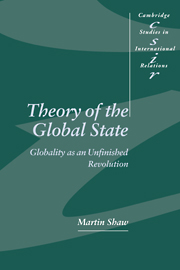Book contents
- Frontmatter
- Contents
- Preface
- 1 Introduction: globality in historical perspective
- Part I Critique
- Part II History and agency
- 4 Internationalized bloc-states and democratic revolution
- 5 Global revolution, counterrevolution and genocidal war
- Part III State
- Part IV Conclusion
- References
- Index
- CAMBRIDGE STUDIES IN INTERNATIONAL RELATIONS
5 - Global revolution, counterrevolution and genocidal war
Published online by Cambridge University Press: 07 October 2009
- Frontmatter
- Contents
- Preface
- 1 Introduction: globality in historical perspective
- Part I Critique
- Part II History and agency
- 4 Internationalized bloc-states and democratic revolution
- 5 Global revolution, counterrevolution and genocidal war
- Part III State
- Part IV Conclusion
- References
- Index
- CAMBRIDGE STUDIES IN INTERNATIONAL RELATIONS
Summary
It is widely recognized at the beginning of the twenty-first century that world politics are undergoing fundamental change. However, neither in the analytical nor in the historical accounts of ‘post-Cold War’ transformation has a successful synthesis been achieved between structural change and the role of agency conceived as purposeful social action. As we saw in chapter 3, attention has focussed either on transformed socio-economic relations, or on relations between national state and other entities conceived within the loose categories of ‘regime’, ‘community’ and ‘governance’.
In the expanded discussions of civil society and social movements, their contributions to the transformation of state relations have hardly been considered. Correspondingly, the connections between structural change and revolutionary social movements in the historical upheaval remain largely unexplored. Even prominent analysts of earlier radical waves have explicitly denied the revolutionary character of our own times. Thus for Eric Hobsbawm, ‘the world at the end of the Short Twentieth Century is in a state of social breakdown rather than revolutionary crisis …’ For Fred Halliday, there is a ‘permanence of unrest’, but the agenda of change that the classic revolutions inaugurated may now be achieved through reform: the revolutions of 1989 (and, for that matter, 1956 and 1968) don't really count. For these analysts, schooled in earlier Marxist traditions, this is not a change in the character of revolution, but a transformation of revolution into something else.
- Type
- Chapter
- Information
- Theory of the Global StateGlobality as an Unfinished Revolution, pp. 144 - 170Publisher: Cambridge University PressPrint publication year: 2000



